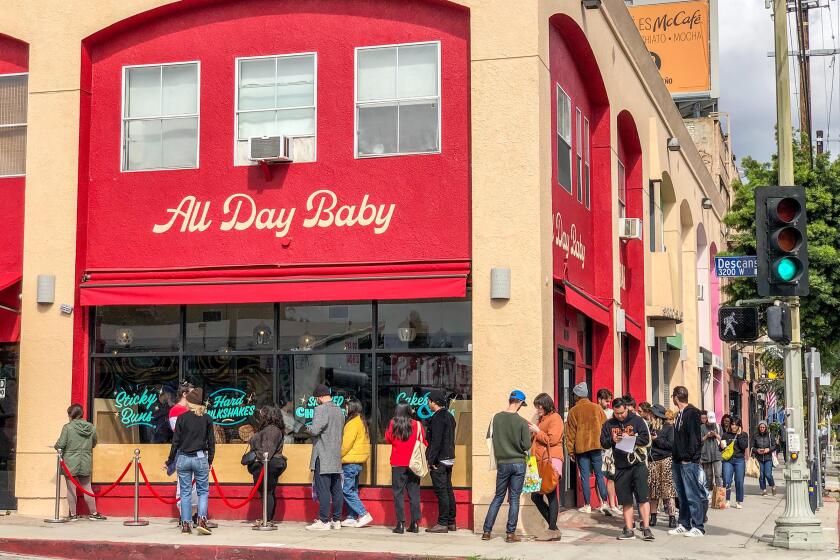PRIVATE FACES, PUBLIC SPACES : Retirement Is Not in the Immigrant’s Lexicon
In an old house on Kenmore Avenue, Hagop Danaian makes Armenian pizzas and breads. The bakery is always warm; before dawn, the loaves are tucked into the huge steel oven that he made with his own hands, years ago. Dozens more wait, covered in threadbare and treasured rags; Danaian prides himself on keeping everything clean, on using only the finest wares. On the floor, baskets of olive-oil soaps from Syria, coffee pots and grinders, candles, dates, raisins, charms to ward off the evil eye. In this bakery, fate and destiny are ever present.
In the kitchen, in his home through another door, his wife is making meat sauce for the pizza: grinding meat, chopping vegetables. He was up at 2 in the morning to buy them. “A bakery is hard,” he says, “I have burned my life.”
When he went to the hospital to have his ulcers cut out, his gall bladder removed, he paid cash.
When the wound became infected, he had it incised without anesthesia and came home that day to work. Without insurance, a man does not linger in the hospital.
Men come to his shop now, remembering how they came as children a quarter of a century ago. They bask in the kindness in his sharp, dark eyes, his large, certain smile; in the breads and herbs that smell of countries far, far off. He is 67, and never seems tired, never complains. They take him as he seems.
His life was a journey of tears--Aleppo, Damascus, Yerevan, Beirut. When his mother died, his father put him into an orphanage with his sister; he was 3 months old. “To my father, if a mother dies, her children should also die. To him those children are nothing.” Years later, his father came back for him, set him to work in a bakery.
Sunrise to sunset, cleaning, carrying, feeding the ovens with wood brought in by camel; he was 10 years old. “I don’t remember one time in my life,” he says, “that my father said, ‘Take one kiss,’ ‘come here, my son, I love you.’ ”
He ran away from his father when he was 20, away from a desolate Soviet Armenia to which his father’s dreams had led them. When the Turks caught him, they put him into a prison camp for four months--hungry, frightened months, when he thought he would die of the beatings. In prison, he found old newspapers in the snow and taught himself to read.
Years later, in a concrete dormitory on the spit of sand that was oil-rich Qatar, he taught himself to write--so that he could write to the wife and small children he had left in Syria. Three years in the desert, a contract worker: “As an outsider, I was nothing there, nothing.” To be a baker in Syria was to be poor and hungry; to be a welder in the desert was to know a little money and unrelieved loneliness. He has forgotten neither.
His wife, Lucin, knew another hardness. Her mother grew up in Turkey, in a home with servants that looked over green hills and valleys--her family’s land. In Lucin’s bedroom is an old photograph of aunts, uncles, cousins--all killed in 1915, in the Turks’ massacres of Armenians. In the faded photograph: tall men, solemn, in stiff, best jackets, hands stoutly set on their knees--their ghosts lingering in the lives that came after them.
In Syria, where her family had taken refuge, Lucin was a teacher. In America, she became a baker. “God gave women two shoulders,” she says, “so that when one shoulder is broken, there is another to carry the burdens.”
When they first came to the United States, in 1966, Hagop worked all day as a welder, at night as a baker; in between he sold bags of grapes for $1. And thought he had awakened in paradise. “I came to Los Angeles and I said, ‘Here is heaven.’ ”
He has worked seven days a week for years. And every year, in the month of August, he has closed the bakery and traveled. To India to see the Taj Mahal, to Greece, Thailand, Brazil, countries of his dreams. At last, he became the American tourist he had watched from afar on the beaches of Lebanon, marveling that men could sit in a chair and rest.
More to Read
Eat your way across L.A.
Get our weekly Tasting Notes newsletter for reviews, news and more.
You may occasionally receive promotional content from the Los Angeles Times.










